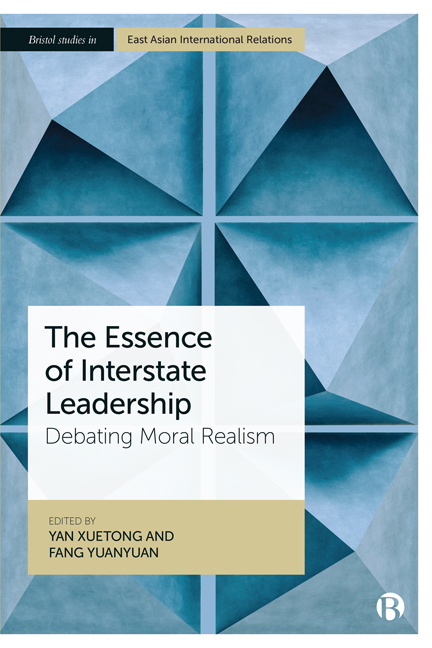Book contents
- Frontmatter
- Contents
- List of Abbreviations
- Notes on Contributors
- Preface
- 1 Interstate Leadership, Moral Realism, and their Critics
- 2 IR Moral Realism as a Universal Theory
- 3 Moral Realism as an Alternative Approach to the Agent-Structure Problem
- 4 Prospects, Promise, and Limitations of Moral Realism
- 5 Ideal Morality and Realist Interest of Moral Realism
- 6 The Conception of Morality in Moral Realism
- 7 Moral Realism and Hegemonic Transition
- 8 Innovation of Moral Realism and Dialogue with It
- 9 Moral Realism and Sino-American Relations
- 10 Moral Realism on Interstate Leadership in Response to Critics
- Appendix 1 Written Discussion between Rajesh Rajagopalan and Yan Xuetong
- Appendix 2 ‘Chinese School’ as an Inappropriate Title
- Selected Bibliography
- Index
8 - Innovation of Moral Realism and Dialogue with It
Published online by Cambridge University Press: 18 January 2024
- Frontmatter
- Contents
- List of Abbreviations
- Notes on Contributors
- Preface
- 1 Interstate Leadership, Moral Realism, and their Critics
- 2 IR Moral Realism as a Universal Theory
- 3 Moral Realism as an Alternative Approach to the Agent-Structure Problem
- 4 Prospects, Promise, and Limitations of Moral Realism
- 5 Ideal Morality and Realist Interest of Moral Realism
- 6 The Conception of Morality in Moral Realism
- 7 Moral Realism and Hegemonic Transition
- 8 Innovation of Moral Realism and Dialogue with It
- 9 Moral Realism and Sino-American Relations
- 10 Moral Realism on Interstate Leadership in Response to Critics
- Appendix 1 Written Discussion between Rajesh Rajagopalan and Yan Xuetong
- Appendix 2 ‘Chinese School’ as an Inappropriate Title
- Selected Bibliography
- Index
Summary
A bipolar scenario for the future global order?
The ‘moral realism’ of Professor Yan Xuetong is challenged to bring evidence and demonstration of its eminent appropriateness in light of the urgent need to frame empirical research on the current global transition. Yan's English language books and articles are innovative in focusing on a crucial twofold question. The first question is an interpretation of the consequences of the parallel processes of a rising China and a declining US. Yan's interpretation of the inevitable change in the current multipolarity focuses on the emergence of a new bipolar world, including a new kind of Cold War. Consistent with his realist approach, Professor Yan is far more optimistic about the survival of the US superpower than about the future evolution of the EU civilian power. Moreover, Europe's expected decline, as discussed in Yan's Inertia of History, another relevant book, would occur simultaneously with the decadence of Brazil, India, Japan, and Russia. The second question concerns the unprecedented features of the new US– China bipolarity expected to emerge within the next decade, described as a different bipolarity ‘in form and content’ from that of the first one of the US and the USSR from 1947 to 1991.
The reader is thus challenged to resolve the puzzle: the mutual threat of the use of nuclear weapon capabilities, the growing primacy of China in economic globalization, and the struggle for technological leadership in the digital economy will interplay in a context wherein ideological confrontation matters far less than it did in the previous bipolarity, making possible the hope of coexistence without downgrading bipolar rivalry to military conflict. Yan's theses are well presented and sometimes provocative: however, his forecast of a coming bipolarity addresses four controversial issues of both an empirical and theoretical kind.
First, does this bipolar scenario risk underestimating the US? Yan is perfectly right about the US's hegemonic decline; however, in military terms, the multipolar world is still markedly asymmetrical in favour of the US, at least for several decades to come. The gap between China and America remains considerable , 6000 n.- heads: 300 according to the annual Stockholm International Peace Research Institute (SIPRI) Report statistical data on capabilities.
- Type
- Chapter
- Information
- The Essence of Interstate LeadershipDebating Moral Realism, pp. 143 - 161Publisher: Bristol University PressPrint publication year: 2023



